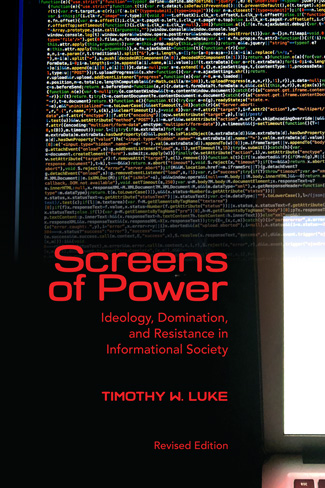Now available! Screens of Power: Ideology, Domination, and Resistance in Informational Society, by Timothy W. Luke. Purchase your copy in our online store and save 20% by using the coupon code BOOKS20 during checkout. Also available in Kindle ebook format at Amazon.com.
Screens of Power
Ideology, Domination, and Resistance in Informational Society
 by Timothy W. Luke
by Timothy W. Luke
With a Foreword by Ronald J. Deibert
This new edition of Screens of Power: Ideology, Domination, and Resistance in Informational Society, first published in 1989, reintroduces the innovative critique of informational culture, politics, and society outlined by Timothy W. Luke in Telos and other publications during the late 1970s and early 1980s. Much has changed, but far more has stayed the same, making this new edition useful for many readers, as digital images ground personal identity, informatics is geopolitics, grand history endlessly reruns as televisually formatted ritual, electronic electioneering never ends, tele-traditional cultures spin up the spirit of tele-ethnicity in new social movements, and digital divides continue crashing against cybernetic exchange.
On now countless screens of power, which are embedded in billions of smartphones, taxi seats, elevator panels, automobile dashboards, refrigerator doors, airport walls, work cubicles, skyscraper displays, exercise machines, and home video centers, a mix of disinformative mystifications exploits with vivid images of violence the unprecedented inequalities and inequities expressed in America’s bitter racial, gender, ethnic, and class conflicts. Their impact is sparking widespread popular resistance because many citizens feel oligarchy and demagoguery in both political parties are eclipsing democracy and opportunity.
Amid a devastating global pandemic, the worst economic crash in nearly a century, and months of violent civil unrest around the nation, new clashes of ideology, domination, and resistance in informational society are aglow on the screens of power. They appear in new patterns in 2020 but resonate with tones and themes heard quite often during the 1980s.
Working with insights derived from the Frankfurt School, Christopher Lasch, Michel Foucault, Guy Debord, and Jean Baudrillard, Luke maps out decisive conflicts and contradictions that leading modern economies and societies faced during the Cold War. At stake here is how to organize effectively the challenging political, social, and cultural transitions from industrial to informational institutions, practices, and values—a far-reaching transformation that continues to unfold today.
The inhabitants of informational society remain intensely engaged in its dense networks, applications, and streams because these formations increasingly are the central structures where collective and individual life develops. For those still curious about how far the deepest foundations of informationalism extend, this study is ready to be explored again.
Praise for Timothy W. Luke’s Screens of Power
“Screens of Power was a pathfinder when it was first published in 1989. Now it is a classic. Timothy W. Luke has added an introduction to the revised edition, with a foreword by Ronald J. Deibert. Luke investigates the politics of the material and symbolic production of meanings utilizing semiotic approaches and critical theory to provide a post-Marxist critique of postindustrialism and to examine power and ideology in informational society. The original book commented on the ‘oppositional politics’ of the 1980s. It is remarkable how this new revised edition speaks to us today.”
—Michael A. Peters, Distinguished Professor, Beijing Normal University, PR China, and Emeritus Professor, University of Illinois
“The most frightening implication of Luke’s study lies in the possibility that, with the increasing ability of modern Western institutional structures to administer and shape the subjective behavior of individuals, one’s own subjective and ethical development, indeed, one’s own entire identity, becomes increasingly indistinguishable from the forces currently governing capitalist political economy. Given the increasing ability of capitalist relations to produce a totality which can define every aspect of our lives, Luke’s work leaves us with the possibility that the current evolution of advanced capitalism has mastered the ability to continue its creeping control of ‘private’ behavior as well as ‘public’ behavior not through domination, but through our own submission to the forces of consumption currently behind the function of capitalist political economy.”
—New Political Science
“Screens of Power provides an excellent introduction to a semiotic reading of economic and social processes in today’s image-dominated environment.”
—American Journalism
“In an era of mindless Marxism-bashing, Luke’s book is truly refreshing. It testifies to the persistent theoretical relevance of the best work in the neo-Marxist tradition.”
—Journal of Politics
About the Author
Timothy W. Luke is University Distinguished Professor of Political Science at Virginia Polytechnic Institute & State University. A longtime Telos editorial board member, he is the author, most recently, of Anthropocene Alerts: Critical Theory of the Contemporary as Ecocritique (Telos Press Publishing, 2019).
For more information, or to schedule an interview with Timothy Luke, please contact: Stephanie Marshall, stephanie@mnspublicity.com • 202-487-3393








